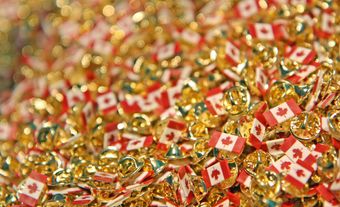Founded in 1834, the St. George's Society of Toronto is one of Canada's oldest philanthropic organizations. The society was created to assist English and Welsh immigrants, and to promote patriotism among English Canadians. Today, the society has three $1-million endowments and gifts, and it makes annual donations to more than 20 charitable causes.
Beginnings
The St. George's Society of Toronto was founded by a group of prominent Torontonians while celebrating St. George's Day (23 April) at the British Coffee House on the corner of York and Wellington Streets, in 1834. That same year, the city of York returned to its original name, Toronto.
St. George, a Roman military officer who gave his fortune to the poor before being martyred, is the patron saint of England. The new society was both a social club for prominent Toronto residents of English descent and a charitable organization that provided assistance for new English and Welsh immigrants to the city. The society was non-partisan. According to the eighth bylaw of its 1855 constitution, “The introduction of political or religious subjects, or their discussion, shall never be allowed at any meeting of the Society.”
Meetings and Members
Meetings included lectures and discussions on the British Empire, and organization of the society's philanthropic activities. Membership was initially restricted to men but according to the 1893 annual report, “the ladies connected with the officers of the Society were invited to evince their interest in the work of the Society, by providing a fund sufficient to furnish the new St. George's Hall.”
The St. George's Society encouraged Canada's connections to the British Empire and welcomed visiting royalty. There were similar societies in other North American cities, and a North American Union of St. George's Societies was established in Philadelphia in 1877.
Past members of the Toronto society include Sir Henry Pellatt, who commissioned Casa Loma, Sir Robert Baden-Powell, founder of the Scout movement, and First World War-era Prime Minister Robert Borden. The society maintains its own historic burial ground and commissioned St. George's Hall, now the Arts and Letters Club, on Elm Street.
Help for Immigrants
Until the virtual elimination of racial discrimination from Canadian immigration law in 1962, the vast majority of immigrants to Toronto were from the British Isles and Europe. Between 1900 and 1914, 100,000 British immigrants settled in Toronto. A “Shacktown” slum developed in northeast Toronto in the late 19th century where impoverished British immigrants settled until they could find employment.
The St. George's Society provided help for newcomers including medical care, assistance finding housing and employment, and Christmas food baskets. The St. James' cemetery provided burial plots for families unable to afford funeral expenses. The society measured the lasting impact of its philanthropic activities, observing that the Canadian-born children of the immigrants it helped did not request assistance for themselves. The society worked with other civic charities to find lasting solutions to urban poverty.
Activities Today
After the Second World War, the St. George's Society expanded its charitable activities beyond English and Welsh immigrants to a broad range of other causes. It arranged for food relief shipments to be sent to elderly people living in bombed areas of Britain in the late 1940s and grants for First Nations children requiring hospital treatment in the 1960s.
Today, charities that receive support from the society include hospitals, AIDS organizations and groups that assist veterans and homeless youth. The society also funds university scholarships and cultural organizations. Its annual fundraiser is the Red Rose Ball, which evolved from the St. George's Day dinners that have taken place since 1834.

 Share on Facebook
Share on Facebook Share on X
Share on X Share by Email
Share by Email Share on Google Classroom
Share on Google Classroom

